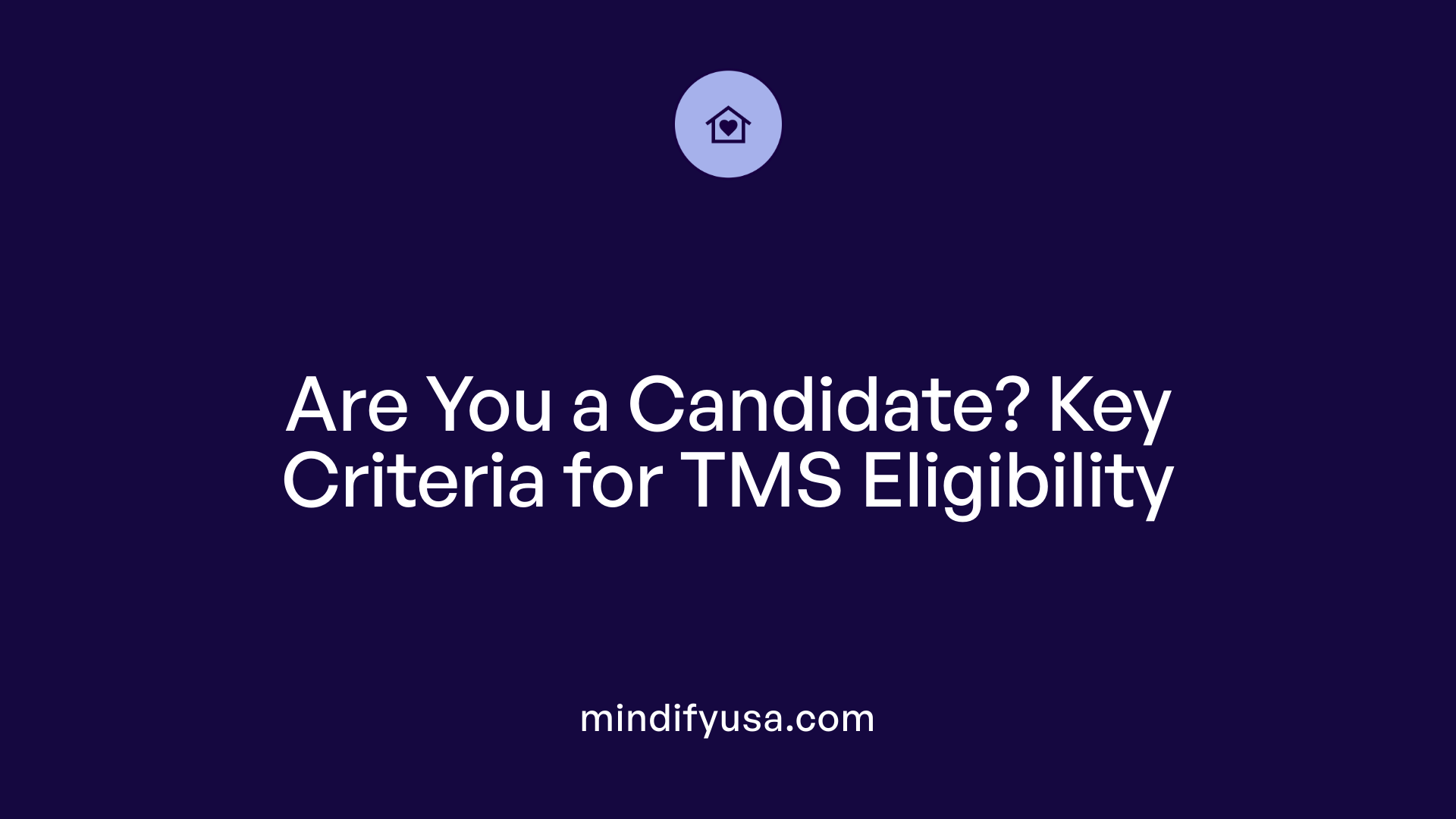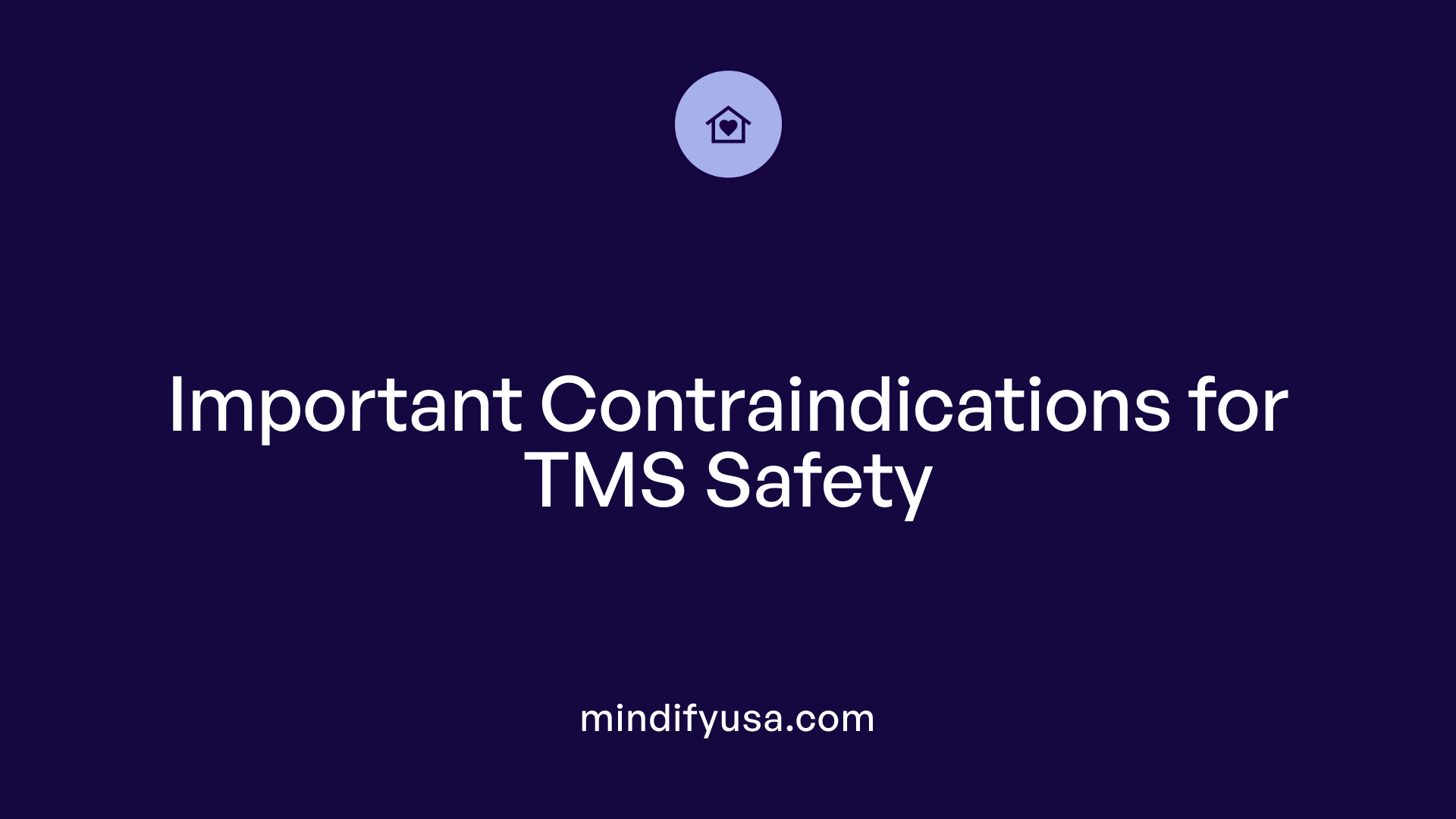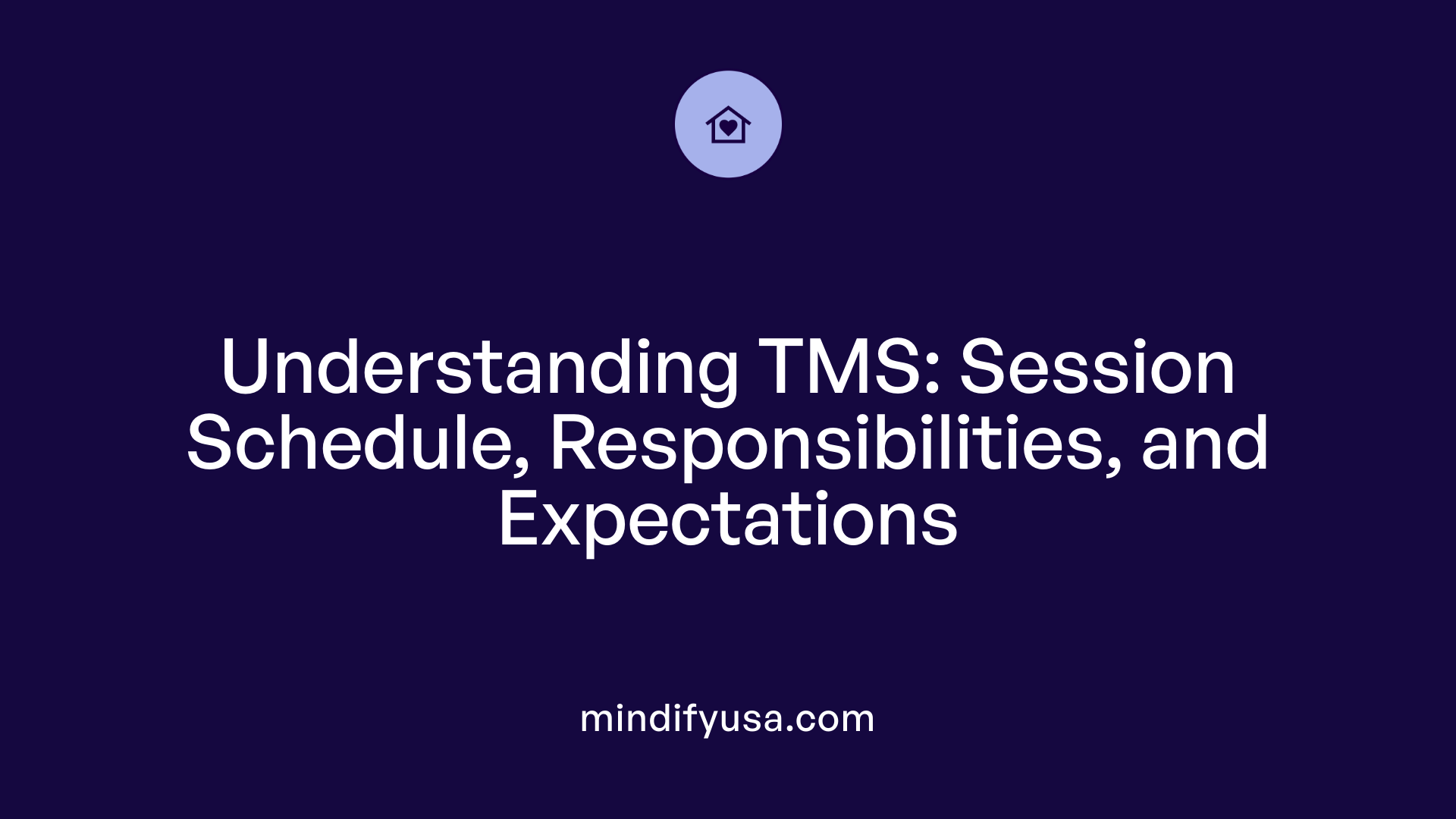Introduction to TMS Candidacy
Transcranial Magnetic Stimulation (TMS) has emerged as a promising non-invasive treatment option for various mental health conditions, especially treatment-resistant depression (TRD). Understanding who qualifies for this therapy is crucial for patients considering TMS as a viable treatment pathway. This article explores the core criteria that define TMS eligibility, helping patients and clinicians navigate the process of candidacy assessment and ensuring safe and effective treatment decisions.
Core Eligibility Criteria for TMS

How can I determine if I am suitable for TMS therapy?
Determining your suitability for Transcranial Magnetic Stimulation (TMS) starts with a thorough evaluation by a qualified mental health professional. During this assessment, your medical history, current health condition, and previous treatments are carefully reviewed.
Special attention is given to any metal implants or medical devices near the head, such as cochlear implants or pacemakers, which could contraindicate TMS. Your psychiatrist will also evaluate whether you have neurological conditions like seizures or brain tumors, which may disqualify you from treatment.
TMS is mainly recommended for individuals with treatment-resistant depression or OCD, especially if they have not experienced sufficient relief from traditional medications.
This assessment process includes a detailed psychiatric interview, a review of medication history, and possibly diagnostic imaging. The goal is to ensure that TMS is a safe and appropriate option for your specific health profile.
Ultimately, the decision to proceed depends on the clinician’s judgment based on these evaluations and your overall health status.
Contraindications and Disqualifying Factors

What are the contraindications or disqualifications for TMS treatment?
TMS therapy, while safe and effective for many, has specific contraindications that make some individuals unsuitable candidates. A thorough medical and psychiatric evaluation is crucial before initiating treatment to ensure safety and maximize benefits.
One of the primary disqualifiers is a history of seizures. Patients with a seizure disorder or a recent seizure are generally advised against TMS, as the magnetic pulses can potentially trigger seizures, posing significant health risks. Similarly, individuals with neurological conditions like brain tumors or severe brain injuries may not be suitable candidates because these conditions could be worsened by magnetic stimulation.
Metal implants and electronic devices in or near the head also contraindicate TMS. This includes cochlear implants, intracranial aneurysm clips, pacemakers, vagus nerve stimulators, deep brain stimulators, and ferromagnetic metallic objects such as shrapnel or dental implants close to the treatment area. These devices can malfunction or be damaged by the magnetic fields, leading to serious complications.
Pregnancy is another consideration. Although TMS is generally considered safe for pregnant women due to its targeted approach and lack of systemic medication, the limited research and cautionary stance mean that pregnant women are usually advised to avoid TMS unless the potential benefits outweigh the risks.
Patients with active substance abuse or intoxication are often temporarily disqualified until they achieve stabilization. Substance abuse can interfere with treatment response, and active addiction might compromise safety. Additionally, those experiencing active suicidal thoughts need to stabilize their condition before starting TMS to ensure psychological safety and treatment efficacy.
In summary, contraindications include:
- History of seizures or epilepsy
- Presence of metal or electronic implants in or near the head
- Brain tumors or severe neurological disorders
- Pregnancy (generally advised against, unless evaluated and approved by a clinician)
- Active substance abuse or intoxication
A comprehensive screening process involving medical history, neuroimaging if necessary, and physical examination helps identify these factors and determine whether TMS is an appropriate treatment option.
| Disqualifying Factors | Specific Conditions and Devices | Rationale |
|---|---|---|
| Seizure history | Personal or family history of seizures, epilepsy | Increased seizure risk during magnetic stimulation |
| Metal implants and electronic devices | Cochlear implants, aneurysm clips, pacemakers, vagus nerve stimulators, metal fragments | Potential device malfunction or physiological damage |
| Neurological conditions | Brain tumors, recent traumatic brain injuries, active neurological disorders | May be worsened by magnetic pulses, increased risk of adverse effects |
| Pregnancy | Pregnant women | Limited safety data, caution advised |
| Active substance use | Current intoxication or active substance abuse | Treatment and safety may be compromised |
| Psychiatric instability | Active psychosis, suicidal ideation, severe mental health crises | May require stabilization to ensure safety during therapy |
Careful assessment by qualified healthcare providers ensures that only suitable candidates undergo TMS, balancing potential benefits against risks and safety concerns.
The Evaluation Process for TMS Suitability

How can I determine if I am suitable for TMS therapy?
Determining if you are a good candidate for Transcranial Magnetic Stimulation (TMS) involves a thorough assessment by a qualified healthcare professional. The evaluation process is designed to ensure safety and maximize treatment effectiveness.
Initially, you will undergo a detailed review of your medical history. This includes checking for any metal implants in or around the head, such as aneurysm clips, cochlear implants, or metallic fragments, which can interfere with TMS treatment. Conditions like brain tumors or severe neurological disorders are also relevant as they may disqualify some candidates.
Your psychiatric history is equally important. The clinician will evaluate your mental health, focusing on a diagnosis of treatment-resistant depression (TRD) or OCD, since these are primary conditions TMS is approved to treat. They will assess previous treatments, including medication responses and psychotherapy, to determine if traditional methods have been ineffective.
Imaging procedures, like MRI scans, may be used to gain detailed insights into your brain structure. This helps in patient-specific coil placement and ruling out abnormalities that might affect treatment safety or success.
A comprehensive medication review is essential. The clinician will review your current and past medications to understand your response to antidepressants or other relevant drugs. Candidates usually have tried at least two different antidepressants without satisfactory results.
Finally, your motivation and ability to commit to the treatment schedule are crucial. TMS typically involves daily sessions, five days a week, over four to six weeks. The success of therapy depends heavily on patient adherence.
Summary of evaluation steps:
| Step | Focus Area | Purpose | Additional notes |
|---|---|---|---|
| Medical history review | Metal implants, neurological conditions | Screen for contraindications | Excludes patients with certain implants or neurological issues |
| Psychiatric and neurological assessments | Mental health diagnosis, symptom severity | Confirm diagnosis and treatment resistance | Essential for establishing treatment plan |
| Imaging procedures | Brain scans (MRI) | Identify structural abnormalities | Optional but useful for personalized treatment |
| Medication and treatment history | Past medication responses | Ensure eligibility based on response | Prior failed treatments increase suitability |
| Patient motivation and commitment | Willingness to attend sessions | Improve adherence and outcomes | Treatment requires consistent participation |
This comprehensive assessment ensures that TMS is a safe, appropriate, and potentially effective option. If you meet the criteria based on these evaluations, your healthcare provider can guide you through the next steps towards starting TMS therapy.
For more detailed information, searching terms like "TMS suitability evaluation," "patient assessment for TMS," and "pre-treatment screening for TMS" can provide additional resources and guidance.
Patient Commitment and Treatment Protocols

How often are TMS sessions scheduled, and what is the typical duration?
TMS therapy usually involves daily sessions, five days a week, over a period of four to six weeks. Each session generally lasts between 30 to 45 minutes, depending on the specific protocol used. Most treatment plans comprise a total of about 20 to 30 sessions, aiming to provide sufficient magnetic stimulation to induce therapeutic effects in the brain.
What are the responsibilities of patients during TMS treatment?
Patients must commit to attending every scheduled session promptly and consistently throughout the entire course. It’s important to inform the medical team about any adverse effects or changes in symptoms. Patients are encouraged to maintain a healthy lifestyle, avoid alcohol or drugs that might interfere with treatment, and continue any prescribed therapy unless advised otherwise. Preparing for each session by following pre-treatment instructions optimizes safety and effectiveness.
What are the expected outcomes of TMS therapy and what is the typical response rate?
Many patients experience significant improvement in depressive symptoms, with over 75% reporting at least a 50% reduction in their symptoms. The response rate for treatment-resistant depression often ranges from 70% to 75%, and more than 60% of patients maintain symptom relief for over a year following treatment. While outcomes can vary, most patients see noticeable relief, which can substantially improve their quality of life. Long-term maintenance treatments or booster sessions may be recommended for ongoing symptom control.
How are side effects monitored and managed during TMS?
Monitoring is a critical part of TMS treatment. Patients are observed throughout each session for any immediate discomfort or adverse reactions. Typical side effects include mild headaches, scalp discomfort, and lightheadedness, which usually resolve within a short time. Rare but serious side effects, such as seizures, are very uncommon, occurring at a rate of approximately 1 in 30,000 treatments. If side effects arise, adjustments in stimulation parameters or additional supportive care are provided. Consistent follow-up allows healthcare providers to assess ongoing response, manage side effects effectively, and make necessary treatment adjustments.
Summary and Next Steps
Understanding the eligibility criteria for TMS therapy enables patients and healthcare providers to make informed decisions about treatment options. A thorough assessment by qualified clinicians ensures safety and optimizes outcomes. If you believe you meet the criteria for TMS, the next step is to consult a specialist who can evaluate your individual circumstances, discuss potential benefits and risks, and develop a personalized treatment plan. As TMS continues to expand its applications, staying informed about candidacy requirements is essential to accessing this innovative therapy and improving mental health outcomes.
References
- Determining Ideal Candidates for TMS Therapy - APG Health
- Patient Selection for TMS Therapy: Criteria and Considerations
- Who Is Eligible for Transcranial Magnetic Stimulation
- Is TMS Right for You? Understanding the Eligibility and Benefits
- Is TMS Therapy Right for You? Exploring the Candidacy Criteria
- Is TMS Right for You? How to Determine if You're a Candidate for ...
- Good Candidates for TMS Depression Therapy






































































































